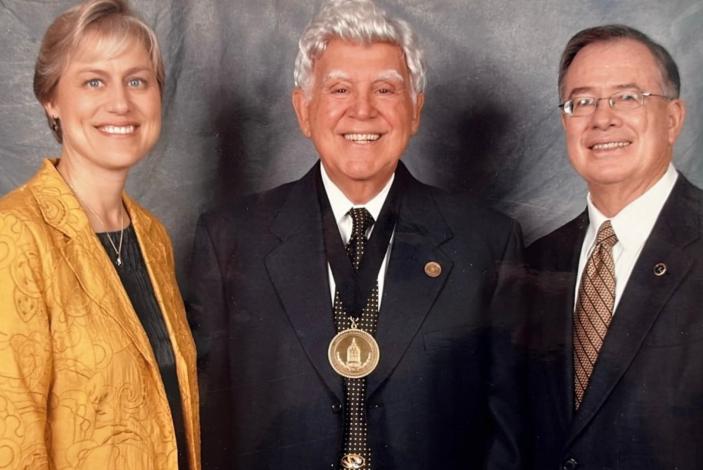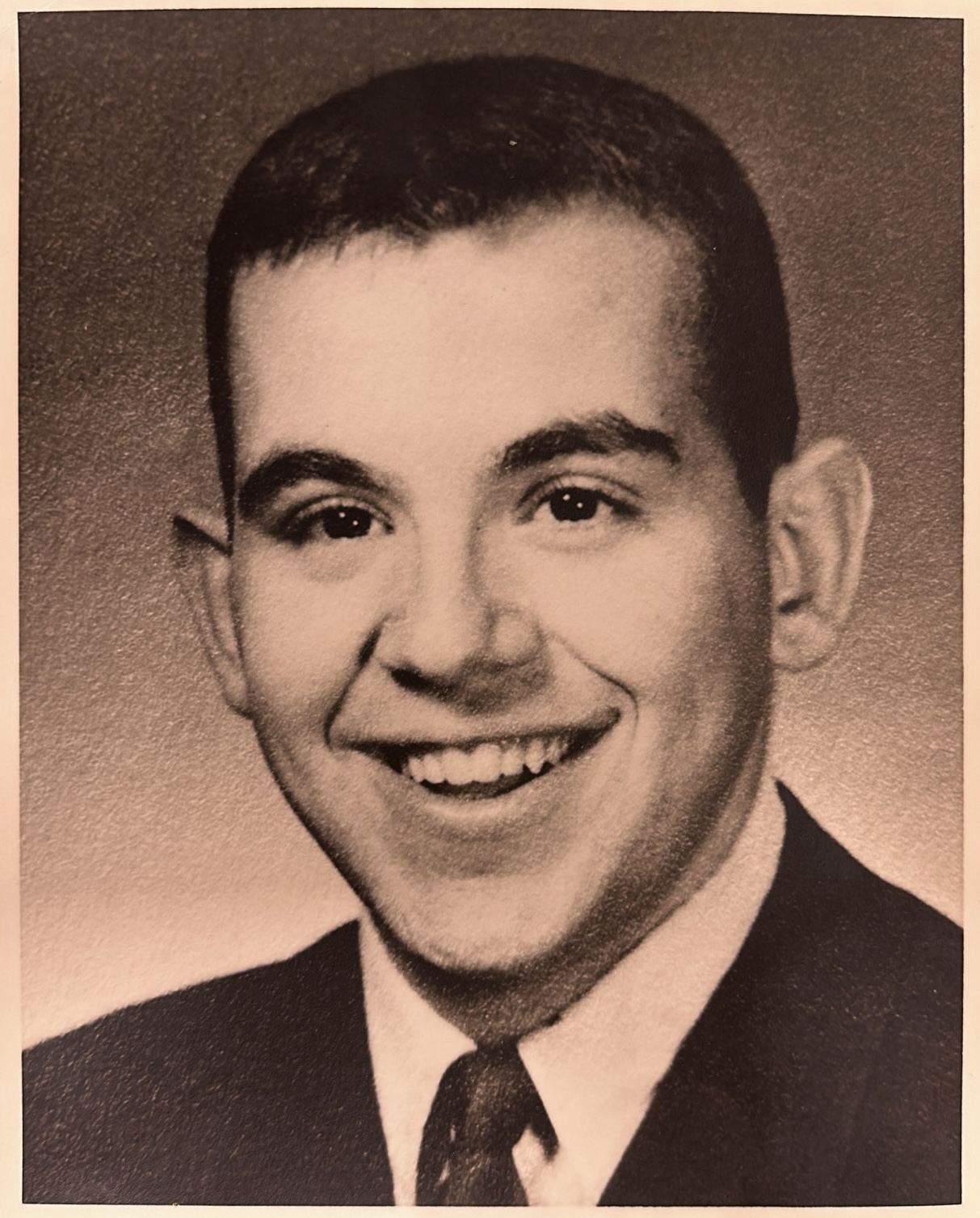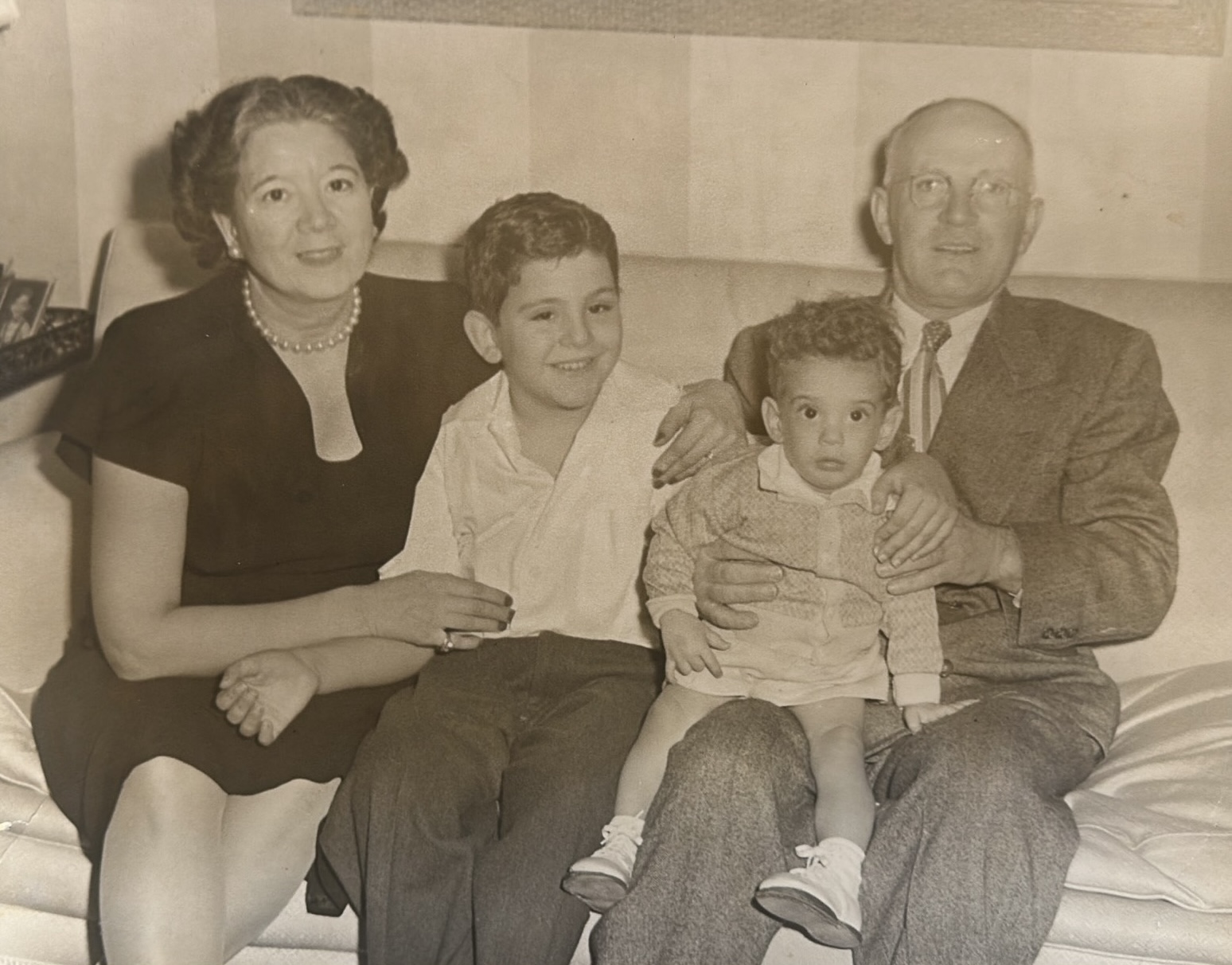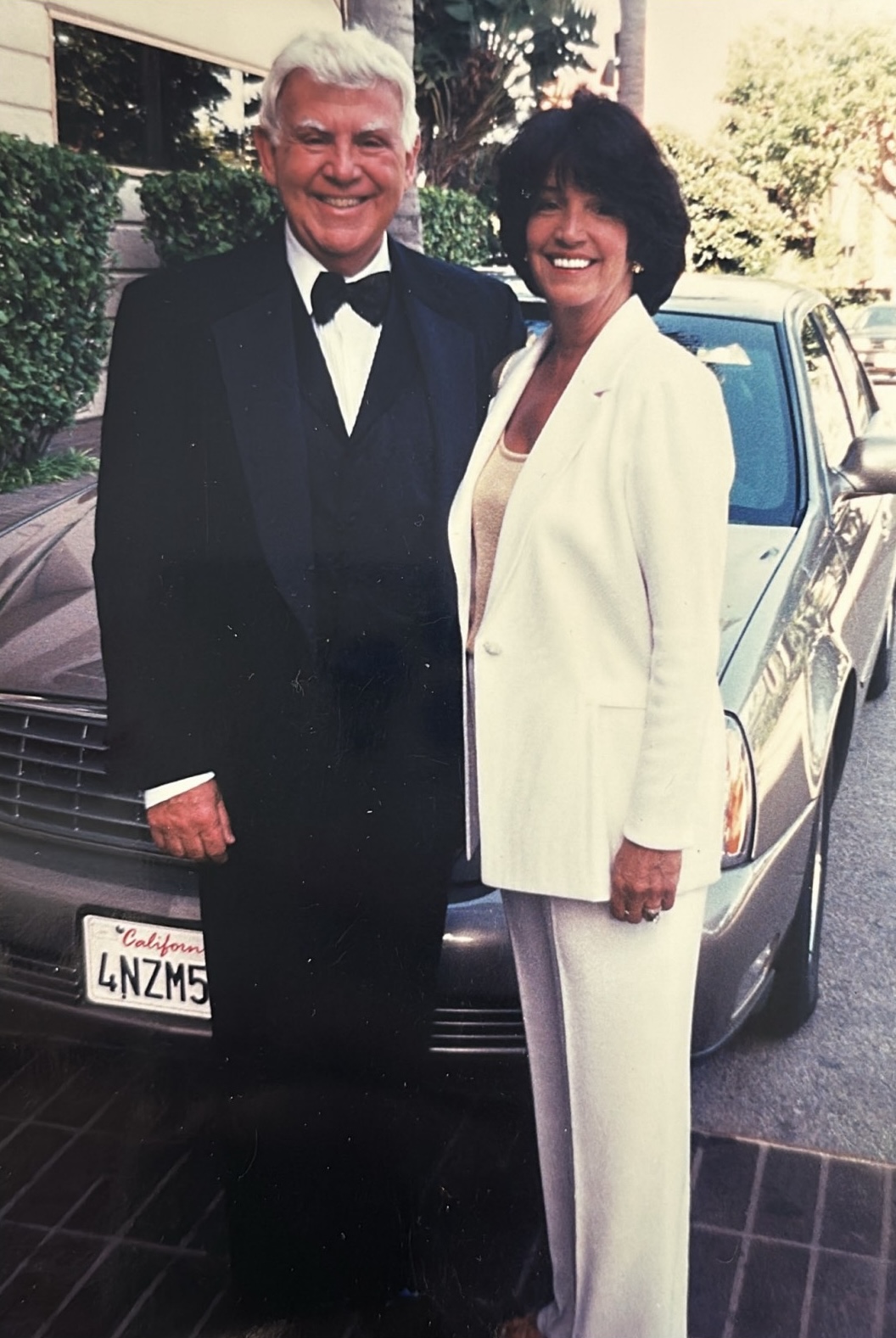
Leslie Flegel's entrepreneurial journey: A story of risk, reward and philanthropy

Leslie Flegel, center, was honored in 2011 by the Mizzou Alumni Association. On the left is Pam Oberdiek, past president of the Mizzou Alumni Association and member of the Crosby MBA Advisory Board, and on the right is Brady Deaton, former chancellor of the University of Missouri.
This article originally appeared in the Fall 2024 issue of Trulaske Magazine.
Leslie Flegel, A.B. ’59, once promised himself that if he ever made it big, he would give back to his alma mater – the University of Missouri.

The nationally recognized entrepreneur – whose 11-year tenure with Source Interlink grew the company’s sales from $2 million to $2 billion – has long made good on his promise, supporting the Robert J. Trulaske, Sr. College of Business for decades with his time, money and expertise.
“The importance of giving back is a big lesson I learned from my late wife,” said Flegel, whose philanthropic partner of more than 60 years, Elynor Flegel, died in 2021. “ You gain more from giving than you’ll ever gain from taking. That’s a message I think entrepreneurial people believe in.”
In 1995, then Dean Bruce Walker invited Flegel, a St. Louis native, to be an executive-in -residence at the Trulaske College of Business. Inspired by the experience, Flegel continued his involvement, joining the Davenport Society and serving on the Strategic Development Board [now known as the Trulaske Dean’s Advisory Board] for a number of years. He also joined the university’s Jefferson Club and the Mizzou Alumni Association. In 2005, Flegel received the college’s Citation of Merit and spoke at the Trulaske College of Business commencement ceremony. Later, Flegel and Source Interlink pledged $400,000 over five years to support the college’s Center for Entrepreneurship and Innovation.
Now retired, Flegel remains a staunch supporter of the college and believes entrepreneurship is the backbone of the country.
“No matter what you do, it’s those with an entrepreneurial spirit who advance,” he said.
An idyllic childhood
Flegel and his older sister spent their early childhood amongst a large confluence of Jewish immigrant families in a neighborhood that today runs along Martin Luther King Drive in St. Louis. His parents each arrived in the United States as children from small villages in Ukraine. They later met on a blind date set up by Pearl Flegel, his mother’s friend and father’s sister.
Relatives on his mother’s side were deeply religious while those on his father’s side were rough around the edges and supported by “tough guys” in the scrap metal business. But the hard-working Flegel men were resourceful and innovative and soon discovered they could turn a profit by shipping metal east to New York and selling it there for more money. Eventually, Flegel’s father and two uncles used their earnings to open two used car lots – a smart move in the 1940s.
“The demand for cars during World War II was through the roof,” Flegel said. “My dad and his brothers would take the train to Pittsburgh, get used cars and drive them back with another car chained to the bumper. Then, they’d sell them. It was a very successful business.”
Eventually, the family moved from St. Louis to Clayton, where Flegel recalls an “idyllic childhood,” playing baseball with his cousins every day in the neighborhood. As a boy, Flegel loved sports and tolerated school.
“I wasn’t great in school,” he said. “I was a goof off and had a lot of fun.”
A devastating loss

Flegel’s life changed dramatically, however, when he was 15 and his father died by suicide. The elder Flegel was losing his eyesight and struggling financially. His death left Flegel and his mother devastated and nearly destitute. Days later, a sad and angry Flegel was holed up at his sister’s house, when he heard a knock on the bedroom door.
It was the family rabbi, and he had a message for the grieving teen: “Everyone in life gets backed up to a wall and feels like they are glued there and can never get away. But you have two choices: You can stay there for the rest of your life or fight your way back. The choice is yours.”
The words hit hard, and Flegel cried for the first time since losing his father. In the years to come, the rabbi’s message would guide him, through good times and bad.
With the help of his sister and her husband, Flegel and his mother resettled in an efficiency apartment in University City. Still, Flegel felt untethered and flailed through high school, bouncing from one bad group to another until he stumbled into a supportive group of friends. Inspired by their influence, Flegel applied to Mizzou.
“My grades were horrible, but I got in,” he said. “It was at this point that I was resolved to make something of myself.”
A new beginning
Once at Mizzou, Flegel pledged a Jewish fraternity called Sigma Alpha Mu, and the brotherhood was lifechanging.
“I walked into the front door of the fraternity, and there was a big guy named Maurice. He was an upperclassman, and he said, ‘You’re Leslie Flegel. Welcome to your new home.’ Then, he came over and embraced me – it still brings tears to my eyes,” Flegel recalled. “I finally felt at home, which is an important part of my story because it’s why I love Mizzou so much and why I continue to give back. This is where I redeemed myself. I found my life.”
Over the next four years, Flegel matured and took command of his life, making good on the first of three promises he made (and fulfilled) to his mother: complete college, join the Army and marry a Jewish girl.
After graduating from Mizzou in 1959, Flegel took a job at an advertising agency in California. The gig was short-lived. His mother died and Flegel returned to Missouri, where he eventually joined the U.S. Army and was selected as an outstanding trainee at Ft. Leonard Wood. He also married his wife, Elynor, and together they had three children: Jason, Mark and Lauren.

“Elynor was my rock,” Flegel said. “She was always very blunt. After a few weeks of dating, she asked, ‘Where are we with this relationship?’ I told her I had no interest in dating anyone else. She said, ‘I feel the same way about you, Leslie.’ We kissed and that was how it was until the day she died in my arms.”
A risk worth taking
Over the years, Flegel advanced in his career. By the mid-1970s, he was senior vice president of marketing for Aramark of St. Louis, a $4 billion diversified service company with more than 100,000 employees. While there, Flegel set up distribution of periodicals to all the United States Naval bases throughout the world and to all ships at sea.
Though he was successful at Aramark, Flegel wanted to challenge himself.
In 1981, he took a risk and struck out on his own, taking the first steps towards building a business that would eventually become Source Interlink Companies in 1995. Over the next 11 years, Flegel moved the company to Bonita Springs, Florida, and grew its sales from $2 million to $2 billion, making Source Interlink the leading North American provider of magazine sales information and services in 2006.
But it was Flegel’s vision, drive and risk-taking that drove the business to become the powerhouse it did under his tutelage. He had a vision to modernize the industry by updating its magazine distribution methods from regional distributors who used their own fleet of trucks and drivers to a faster, nationwide system that relied on UPS and FedEx to reach more customers at a lower cost.
In 2001, Flegel had Source Interlink purchased what turned out to be a virtually bankrupt company because he recognized the company was using the more efficient UPS and FedEx distribution model. Despite the newly acquired company’s poor financials, Flegel used his business acumen and turned it around by the end of its first year.
“I recognized an opportunity when it came my way and found a way to capitalize on it,” he said.
As it turned out, the near disastrous purchase was among Flegel’s greatest deals because it paved the way for Source Interlink’s largest growth spurt.
Flegel retired in 2006 and is now owner of Flegel Family Enterprises.
“If people say you can’t do something, it’s usually because they can’t do something,” Flegel said. “When people doubt you, don’t buy into their doubt. Believe in yourself – and you believe in yourself by being more knowledgeable than they are, and you can become more knowledgeable by working hard. At Mizzou, I learned I enjoyed learning. I read great books and learned about great leaders. I became a different person. Mizzou did that for me.”
Flegel’s reflections on being an entrepreneur
- Believe in yourself.
- Learn as much as you can about the business you are going into.
- Start small and make mistakes when the stakes are low.
- Learn by watching what people do right, not by studying what you did wrong. Study successful people.
- Read the signs. The signs for opportunity are everywhere. Be ready to recognize an opportunity and capitalize on it.
- Stay disciplined and don’t let your ego get the better of you.
- Build strong business relationships; they’re essential for success.
- Pay attention to the trends. Things change and you must change with them.
- Be creative and think about how you are going to distinguish yourself.